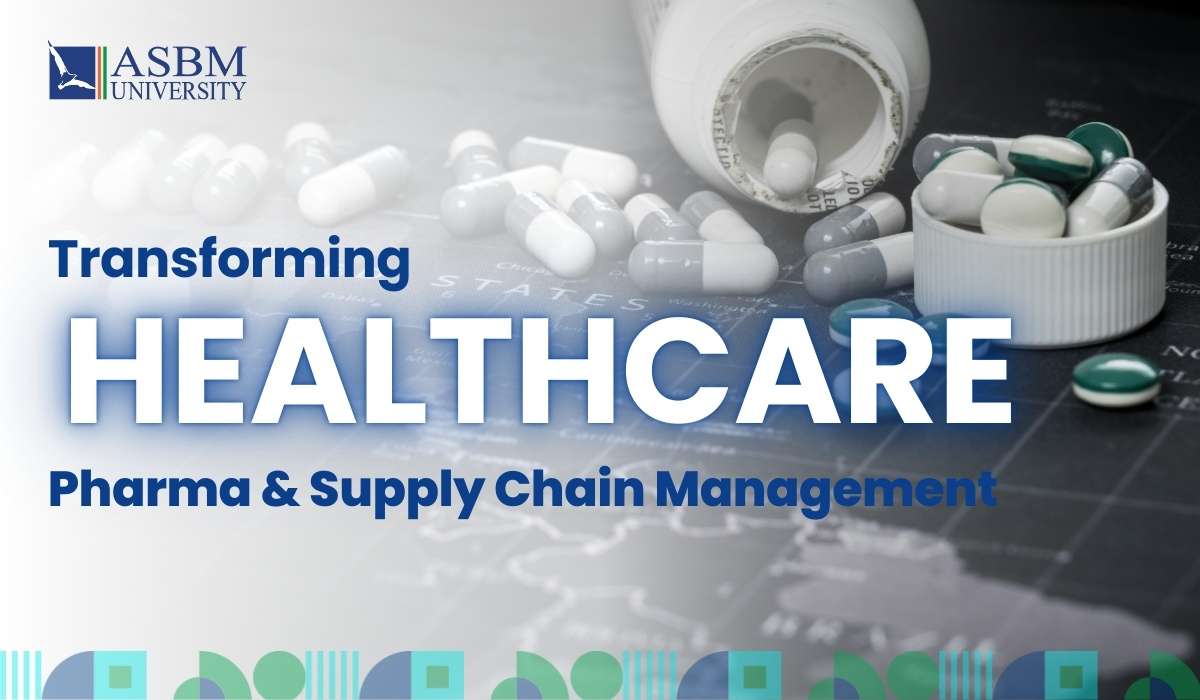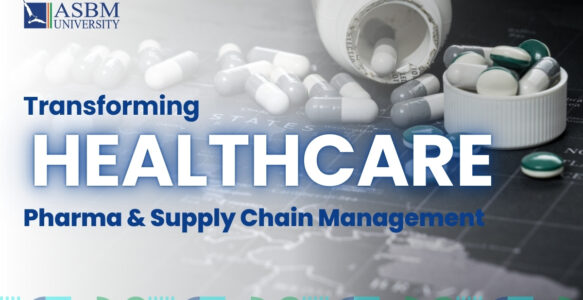Transforming Healthcare: The Power of Pharma Management and Supply Chain Excellence

India’s pharmaceutical industry is one of the largest in the world, contributing significantly to global healthcare by producing affordable medicines and life-saving drugs. As the third-largest producer of medicines by volume and a key exporter of generics, India’s pharmaceutical sector is poised to grow from USD 50 billion to a projected USD 130 billion by 2030. The advancements in pharmaceutical production are the key drivers behind this growth in India. To keep pace with these advancements, the need for specialised education in pharmaceutical management and logistics has also increased.
Education in these fields—particularly MBA in Pharmaceutical Management and MBA in Logistics and Supply Chain Management—is essential for producing professionals who can lead the industry through its next phase of growth. These are some from the many management programmes that are turning out to be pivotal for equipping professionals with the knowledge, skills, and strategies. It’s more about managing the pharmaceutical industry which will come with challenges such as managing the complex regulatory frameworks, handling operational, and supply challenges issues faced by the pharmaceutical sector.
India’s Pharmaceutical Landscape: A Statistical Overview
As per the latest report by Maersk, India supplies 40% of generic drugs to the US and at the same time produces about 60% of the world’s vaccines.
The Indian pharmaceutical market is estimated to reach close to USD 130 billion by 2030, as an influence of the robust domestic market, export strength, and government support through initiatives like the Production Linked Incentive (PLI) scheme.
The pharmaceutical and healthcare sectors are also gained in the number of professionals and is expected to generate over 58,000 new jobs in the next 2-3 years, particularly in the management roles.
India’s Pharmaceutical sector is pretty matured and its growth has been phenomenal. To further strengthen, specialised education in pharmaceutical management and supply chain management will be crucial. Many developed countries are approaching India for pharmaceutical exports, and to meet these demands, the primary objective should be to upskill individuals with specific expertise.
Benefits of Specialised Education in Pharmaceutical Management and Supply Chain Management
Looking at the statistics, it’s clear the pharmaceutical sector is growing and continue to grow. And thus the need for skilled resources will be as important as the production of pharmaceutical products. Specialised education can help individuals acquire the skills to master the sector, analyse and understand complex landscapes, driving fruitful outcomes to support the growth and sustainability of the sector.
The specialised education doesn’t only help in improving the operational excellence, but also ensure innovation in the sector. Skilled individuals can contribute not to the enterprises or organizations, but also benefits the public sector and provide a significant benefit to the society, public health, country’s economic growth and many more.
Let’s deep into the ocean of benefits that the specialised education can bring:
1. Bridging Industry Gaps
Specialised education fills critical gaps in the pharmaceutical sector, equipping professionals to address challenges related to regulatory compliance, supply chain disruptions, and operational inefficiencies. Graduates become vital to pharmaceutical firms, improving their competitive edge in the global market.
2. Promoting Innovation
Professionals in these fields drive innovation by streamlining R&D investments, shortening time-to-market for new drugs, and ensuring that companies adopt cutting-edge technologies in logistics and distribution. This makes Indian firms globally competitive not just in generics but in advanced pharmaceuticals as well.
3. Ensuring Drug Safety and Accessibility
Efficient supply chain management ensures the timely delivery of medicines and minimises wastage. By improving the availability of drugs across urban and rural settings, professionals contribute to better public health outcomes, directly impacting the quality of life across the nation.
4. Economic Growth and Job Creation
India’s pharmaceutical industry is one of the key drivers of the country’s economic growth. Specialised management professionals help companies scale, expand into new markets, and adopt more efficient practices, ultimately contributing to GDP growth. The sector is also a significant source of employment, and the need for trained management professionals will only increase as the industry grows.
Nation-Building Through Pharmaceutical Education
Pharmaceutical education does more than produce skilled professionals; it directly contributes to the country’s national goals:
- Improving Public Health: By ensuring efficient supply chains and driving innovation in drug development, professionals in pharmaceutical management and supply chain management improve healthcare outcomes across the country, contributing to better public health.
- Boosting Economic Resilience: The pharmaceutical sector’s expansion fuels economic growth. The expertise of management professionals ensures that India remains competitive globally, strengthening its position as the “Pharmacy of the World.”
- Strengthening Global Supply Chains: Indian pharmaceutical graduates are key to building resilient global supply chains. Their expertise helps prevent global drug shortages and ensures the availability of life-saving medicines in times of crisis, like the COVID-19 pandemic.
MBA in Pharmaceutical Management: Shaping Industry Leaders
An MBA in Pharmaceutical Management is designed to prepare professionals for the business and regulatory complexities unique to the pharmaceutical sector. This course integrates healthcare policies, drug development, marketing, financial management, and regulatory affairs into a holistic educational framework, ensuring that graduates can contribute to the industry’s success.
Key Roles and Actions:
- Strategic Leadership: Pharmaceutical managers develop strategies that drive R&D investments, streamline product development, and ensure compliance with international regulatory standards. They guide companies in prioritising innovation while maintaining profitability.
- Regulatory Compliance: With in-depth knowledge of national and international pharmaceutical laws, graduates ensure that companies adhere to regulations for drug approvals, patents, and intellectual property, which is critical for expanding to global markets.
- Market Expansion and Growth: These professionals develop marketing strategies for pharmaceutical products, optimising the product lifecycle from development to distribution. They analyse consumer behaviour, understand healthcare market trends, and ensure the products reach the right markets.
- Driving Innovation: The programme equips professionals with the skills to oversee drug innovation and ensure that companies remain competitive. In a country known for its dominance in generic drugs, innovation in new therapeutic areas will propel India into new pharmaceutical arenas, such as biosimilars and personalised medicine.
Impact of MBA in Pharmaceutical Management:
- Corporate Level: Graduates often ascend to senior management roles such as product managers, business development directors, or heads of regulatory affairs. They are responsible for driving corporate strategy in an industry where speed to market and regulatory compliance are critical.
- Industry Level: Pharmaceutical managers contribute to the sector’s growth by making informed decisions that influence product portfolios, market positioning, and global expansion. Their efforts ensure the availability of affordable medicines globally.
For a deeper understanding of the Impact of MBA in Pharmaceutical Industry, explore our detailed article that highlights how this specialized education can lead to innovation, business growth, and improved healthcare outcomes.
MBA in Logistics and Supply Chain Management: Ensuring Efficient Pharmaceutical Distribution
An MBA in Logistics and Supply Chain Management plays a crucial role in optimising the pharmaceutical supply chain, which is central to ensuring that medicines are produced, stored, and distributed efficiently. Given the sensitive nature of pharmaceutical products, particularly vaccines and biologics, supply chain expertise is essential for maintaining drug quality and availability.
Key Roles and Actions:
- Cold Chain and Vaccine Distribution: Graduates from this course are trained to manage the pharmaceutical cold chain, ensuring that temperature-sensitive medicines like vaccines are stored and transported under optimal conditions. This expertise was critical during the COVID-19 pandemic, when the global distribution of vaccines demanded specialised logistics.
- Supply Chain Optimisation: Professionals learn how to streamline supply chain networks to reduce costs, eliminate inefficiencies, and enhance delivery speed. By adopting digital technologies such as AI and blockchain, they can ensure transparency and security across the supply chain.
- Sustainability and Green Supply Chains: With increasing pressure on industries to adopt sustainable practices, graduates from this programme are well-versed in creating environmentally friendly supply chains. This is essential in an era where reducing the carbon footprint and optimising resource usage are becoming business imperatives.
- Crisis Management: Supply chain managers are crucial during health crises, such as pandemics, when drug shortages or disruptions in the global supply chain can impact healthcare outcomes. Their expertise ensures that essential medicines are always available, even in challenging circumstances.
Impact MBA in Logistics and Supply Chain Management:
- Corporate Level: Professionals start in roles like supply chain analysts, logistics managers, and operations managers, with a clear pathway to leadership positions such as COO or supply chain director. Their contributions directly impact a company’s ability to deliver medicines efficiently, affecting both bottom-line performance and public health outcomes.
- Industry Level: The pharmaceutical supply chain plays a pivotal role in ensuring drug availability across India and globally. Graduates from this programme ensure that medicines reach the remotest corners of the country, enhancing healthcare access for underserved populations.
Conclusion
Pharmaceutical education, especially in management and supply chain domains, is a powerhouse that drives India’s pharmaceutical industry forward. An MBA in Pharmaceutical Management empowers professionals to lead strategic initiatives, innovate in drug development, and navigate complex regulatory frameworks, while an MBA in Logistics and Supply Chain Management ensures the efficient and safe distribution of pharmaceutical products. Together, they play an essential role in nation-building by enhancing public health, driving economic growth, and positioning India as a global leader in pharmaceuticals.
As the industry continues to evolve, the demand for professionals with specialised management skills will only increase, making these educational programmes key contributors to both the sector’s and the nation’s success.



